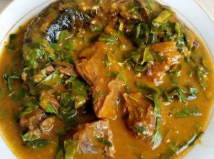Ewedu- per pack (Subscriber price only)
Description
Ewedu (Corchorus olitorius), also known as jute leaves, is a slimy, green leafy vegetable that is a staple in Yoruba cuisine. When cooked, it has a slippery texture, similar to okra, which makes it easy to swallow. The leaves are usually blended or whisked after boiling to achieve a smooth, viscous consistency. Ewedu is prized for its unique taste and texture, as well as its rich nutritional value.
Sources
Primarily cultivated in the southwestern states of Nigeria but also grown in other regions with warm, moist soil. It is commonly sold fresh in open markets and can also be home-grown in backyard gardens.
Health Benefits
-
Rich in vitamins A, C, and E, which promote good eyesight and healthy skin.
-
Supports digestion due to its mucilaginous (slimy) texture.
-
Boosts immunity and helps fight infections.
-
Promotes bone and teeth health with its high calcium content.
-
Aids postpartum recovery in women.
Common soups or dishes you can use it for
-
Ewedu soup (often served with amala and gbegiri)
-
Ewedu with stew and assorted meats
-
Mixed vegetable soups with okra
-
Ewedu with melon (egusi) combination soups
Oha – per pack (Subscriber price only)
Oha (Pterocarpus mildbraedii) is a unique leafy vegetable native to southeastern Nigeria. Known for its slightly bitter-sweet and earthy taste, Oha leaves are tender and delicate, making them perfect for soups. The leaves are usually torn by hand rather than cut, as chopping can make them turn dark and alter the flavor. Oha is a seasonal vegetable, and its fresh leaves are highly sought after when in season.
Sources
Enugu, Imo, and Abia
Health Benefits
-
Rich in iron, which helps in the formation of healthy red blood cells.
-
Contains calcium and magnesium for strong bones and teeth.
-
Supports digestion and helps maintain healthy metabolism.
-
Boosts the immune system with its natural antioxidants.
-
Promotes skin health with its vitamin content.
Common soups or dishes you can use it for
-
Oha soup (traditionally made with cocoyam paste and palm oil)
-
Mixed vegetable soups
-
Oha with egusi (melon seed) soup
-
Oha and achara soup (popular in some eastern communities)
Uziza -per pack(Subscriber price only)
Description
Uziza (Piper guineense) is a fragrant, peppery leaf and seed plant native to West Africa. The leaves have a slightly bitter and spicy taste, while the seeds are pungent with a distinct aroma. In Nigerian cooking, the leaves are used fresh or dried to add depth and spice to soups and stews.
Sources
Primarily cultivated in Southeastern Nigeria, especially in states like Enugu, Abia, Imo, Anambra, and Ebonyi.
Health benefits
-
Aids digestion – helps relieve constipation and bloating.
-
Anti-inflammatory – soothes body pains and inflammation.
-
Boosts immunity – contains vitamins, minerals, and essential oils that fight infections.
-
Improves reproductive health – traditionally believed to boost fertility and sexual health.
-
Rich in dietary fiber – supports gut health.
Common soups you can use it for
-
Nsala Soup (White Soup)
-
Oha Soup
-
Pepper Soup
-
Egusi Soup (especially the Southeastern variation)
-
Okra Soup with mixed leaves









